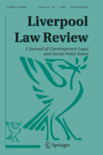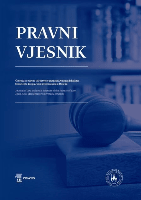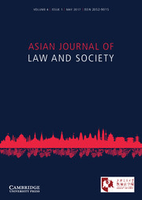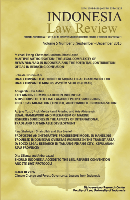
Liverpool Law Review
Scope & Guideline
Illuminating the Intersection of Theory and Practice in Law
Introduction
Aims and Scopes
- Interdisciplinary Legal Analysis:
The journal frequently integrates insights from other fields, such as sociology, psychology, and literature, to enrich legal discussions and provide a holistic understanding of legal phenomena. - Global and Comparative Law:
A significant focus is placed on comparative legal studies, examining laws across different jurisdictions, particularly in relation to international law and human rights. - Emerging Legal Issues:
The journal aims to address contemporary legal challenges, including those arising from technological advancements, environmental concerns, and social justice issues. - Human Rights and Social Justice:
There is a consistent emphasis on exploring human rights law and social justice, particularly how legal frameworks can protect vulnerable populations and promote equality. - Legal Theory and Philosophy:
Contributions often delve into legal theory, examining jurisprudential concepts and their implications for practice and policy.
Trending and Emerging
- Technology and Law:
There is an increasing emphasis on the intersection of law and technology, particularly concerning issues like artificial intelligence, data privacy, and the implications of digital transformation on legal frameworks. - Environmental Law and Sustainability:
Emerging themes include a heightened focus on environmental law, particularly in relation to climate change and the legal frameworks necessary for sustainable development. - Human Rights in Global Contexts:
The journal is increasingly addressing human rights issues on a global scale, especially in the context of international conflicts and the responsibilities of states and corporations. - Social Justice and Equity:
There is a growing trend towards exploring themes of social justice, equity, and the law's role in addressing systemic inequalities, particularly in areas such as gender rights and minority protections. - Interdisciplinary Perspectives on Law:
The incorporation of interdisciplinary approaches is becoming more prominent, as the journal seeks to understand legal issues through lenses of sociology, psychology, and cultural studies.
Declining or Waning
- Traditional Contract Law:
There has been a noticeable decrease in articles focusing on traditional contract law principles, as the journal shifts towards more contemporary issues like digital contracts and consumer protection. - Local or National Legal Issues:
Papers that concentrate solely on local or national legal matters without a broader or comparative perspective seem to be less frequent, indicating a trend towards global and transnational legal discussions. - Historical Legal Analysis:
There is a decline in the number of publications that focus exclusively on historical legal analysis, suggesting a shift towards more current and practical legal issues. - Legal Formalism:
The journal appears to be moving away from purely formalistic legal analyses, favoring approaches that consider social implications and interdisciplinary perspectives.
Similar Journals

Tsinghua China Law Review
Advancing legal scholarship through critical insights.Tsinghua China Law Review is an esteemed academic journal published by the Tsinghua University School of Law in China, dedicated to advancing the field of law through rigorous scholarly analysis and critical discourse. Established in 2019, this journal has carved a niche for itself within the legal community, striving to cover pertinent issues in Chinese law and its intersections with global legal trends. Although it retains an H-index disclaim and has discontinued its coverage in Scopus after 2024, it continues to provide a platform for innovative research and thought-provoking essays. Recognized for its contributions, it is categorized as Q4 in Law based on the latest ranking, positioning it at a pivotal juncture for emerging scholars aiming to make their mark within the legal scholarship landscape. With open access options limited, Tsinghua China Law Review remains a valuable resource for researchers, professionals, and students eager to engage with contemporary legal issues that shape society in an increasingly interconnected world.

Pravni Vjesnik
Championing Accessible Legal Knowledge.Pravni Vjesnik is a peer-reviewed academic journal published by the Pravni Fakultet Sveučilišta Josipa Jurja Strossmayera & Osijek, primarily focusing on the field of law within the social sciences. Since transitioning to an Open Access model in 2016, the journal has broadened its accessibility, allowing researchers, professionals, and students to engage with diverse legal scholarship without subscription barriers. With an ISSN of 0352-5317 and an E-ISSN of 1849-0840, Pravni Vjesnik plays a crucial role in disseminating knowledge and fostering discourse in the legal community, particularly within the context of the Croatian legal system and broader European legal frameworks. Although it holds a rank of #760 out of 1025 in the Scopus database, placing it in the 25th percentile of law journals, its commitment to quality and relevance ensures its importance as a resource for rigorous academic inquiry. The journal's scope is anticipated to expand from 2019 to 2024, promoting ongoing research in contemporary legal issues. This dedication to publishing comprehensive and impactful studies makes Pravni Vjesnik an essential platform for those involved in the legal field.

Adelaide Law Review
Fostering critical analysis in the realm of law.The Adelaide Law Review, published by the University of Adelaide, stands as a notable journal in the field of law, offering valuable insights into a wide range of legal topics relevant to practitioners, scholars, and students alike. With an ISSN of 0065-1915 and a history of publication that has evolved from 2019 to 2023, it serves as a platform for the dissemination of rigorous legal scholarship. Although currently categorized in Quartile 4 within the law category, the journal remains instrumental in contributing to legal discourse, particularly in the Australian context. With a Scopus ranking of #733 out of 1025 and a 28th percentile ranking in Social Sciences Law, the Adelaide Law Review is committed to advancing the understanding of vital legal issues through thoughtful articles, case analyses, and critical commentaries. This journal provides an essential resource for legal professionals and academic researchers seeking to engage with contemporary legal challenges. While it does not offer open access at this time, its scholarly contributions ensure it remains a respected publication within the legal community.

Asian Journal of Law and Society
Bridging Legal Frameworks with Societal InsightsAsian Journal of Law and Society, published by Cambridge University Press, serves as a vital platform for scholarly discourse in the fields of law and social sciences. With an impressive 2023 impact factor placing it in the Q2 quartile in both law and sociology/political science categories, this journal is influential in shaping contemporary legal and sociological thought. Covering a broad range of topics, from legal frameworks in Asian contexts to the interplay between law and societal dynamics, the journal invites researchers, practitioners, and students to contribute original articles, critiques, and interdisciplinary analyses. Although it does not currently offer open access options, the Asian Journal of Law and Society continues to be recognized for its significant contributions, as reflected in its Scopus rankings, where it is positioned in the top 30% of law journals and around the 44% ranking in sociology and political science. This trajectory highlights its importance for anyone interested in understanding the complex legal landscapes and social structures across Asia.

BUFFALO LAW REVIEW
Bridging Theory and Practice in LawBUFFALO LAW REVIEW, published by University at Buffalo State University of New York, stands as a pivotal resource in the field of law, offering a comprehensive platform for scholarly discourse and analysis. With an ISSN of 0023-9356, this journal has been disseminating critical legal research since its inception and is currently recognized in the Q2 category of Law for 2023. Although it operates under traditional access options, its significant contributions to legal scholarship are underscored by its positioning alongside notable peers, as evidenced by its rank of #552 out of 1025 in the Scopus rankings for Social Sciences _ Law, reflecting a 46th percentile placement. The journal spans an extensive timeline of converged years, notably including a continuous publication record from 1973 to 2024. Researchers, professionals, and students alike will find BUFFALO LAW REVIEW an essential repository of legal scholarship, discussing key issues and evolving trends within the domain.

De Jure Law Journal
Advancing Legal Scholarship, One Article at a Time.De Jure Law Journal, published by Pretoria University Law Press, is a reputable open access journal that has been serving the legal community since its establishment in 2011. With its commitment to disseminating high-quality research, this journal focuses on various aspects of law and legal principles, encompassing a broad range of topics from constitutional law to international legal frameworks. The journal's ISSN 1466-3597 and E-ISSN 2225-7160 ensure that it is easily accessible and widely recognized in academic circles. Positioned as a significant contributor to legal scholarship in South Africa and beyond, De Jure Law Journal is dedicated to fostering a critical dialogue among researchers, practitioners, and students alike, making it an essential resource for anyone engaged in legal studies.

Vestnik of Saint Petersburg University-Law-Vestnik Sankt-Peterburgskogo Universiteta-Pravo
Exploring Contemporary Challenges in LawVestnik of Saint Petersburg University-Law, published by St Petersburg University Press, is a vital academic resource in the field of law, particularly significant within the Russian legal landscape. With an ISSN of 2074-1243 and an E-ISSN of 2587-5833, this journal serves as a platform for rigorous research, critical analysis, and scholarly discourse, contributing to the advancement of legal knowledge and practice. Although currently classified in the Q4 quartile for the year 2023 by Scopus rankings, it holds a unique position within the academic community, catering to a diverse audience of researchers, legal professionals, and students, especially those interested in the evolving nuances of law in Russia. You can explore comprehensive studies and articles that reflect the contemporary challenges and developments in law, while benefiting from the journal's focus on fostering a deep understanding of legal principles. The journal runs from 2019 to 2024, encapsulating emerging trends and insights in law that are critical for continuous learning and growth in this discipline.

Derecho PUCP
Exploring the frontiers of legal research.Derecho PUCP is a distinguished open access journal published by the Pontificia Universidad Católica del Perú, specifically from the Faculty of Law. With a commitment to advancing legal scholarship, this journal has been an essential resource in the field of law since 2005, providing researchers, practitioners, and students with access to critical analyses and discussions on various legal topics. Based in Lima, Peru, Derecho PUCP holds a prestigious position with a Q2 ranking in the Law category, reflecting its impactful contributions to the social sciences, particularly in the legal domain. The journal publishes cutting-edge research and promotes innovative discourse, aiming to foster academic excellence and engage with contemporary legal challenges. As it continues to converge into its future issues from 2019 to 2024, Derecho PUCP exemplifies a vital platform for those committed to the pursuit of legal knowledge and research.

Indonesia Law Review
Unlocking Insights into Indonesia's Legal LandscapeIndonesia Law Review is a premier open-access academic journal dedicated to advancing knowledge in the fields of law and social sciences, with particular emphasis on the Indonesian legal landscape. Established by the Indonesian Law Review, this journal has made significant strides since becoming open access in 2014, ensuring that research is freely available to a global audience. Based in Depok, West Java, the journal seeks to foster scholarly discourse on legal issues pertinent to Indonesia, while also contributing to the broader field of education and social sciences. With its current Scopus rankings placing it within the top tiers of law and social sciences, including a Q3 categorization in law and a Q4 classification in education and miscellaneous social sciences, the **Indonesia Law Review** serves as a vital platform for researchers, professionals, and students to disseminate their findings and engage with contemporary legal dilemmas. The journal is committed to providing a robust forum for innovative legal scholarship and is an essential resource for anyone seeking to understand the complexities of law in Indonesia and beyond.

University of Western Australia Law Review
Transforming Legal Perspectives Through Rigorous AnalysisThe University of Western Australia Law Review is a prestigious academic journal dedicated to the critical examination and exploration of legal issues in Australia and beyond. Published by the Law School of the University of Western Australia, this journal has become a significant resource for legal scholars, practitioners, and students alike, contributing to the rich discourse in the field of law. With an ISSN of 0042-0328 and a current categorization in the Q3 quartile in the field of Law as per the 2023 rankings, it stands among a cohort of respected legal publications. The journal, though not open access, facilitates a sharing of unique insights and research from 2019 to 2024, aiming to address emerging and traditional legal challenges within a global context. With a Scopus rank of #651 out of 1025 in Social Sciences Law, it holds a percentile of 36, reflecting its valuable contributions to legal scholarship. The University of Western Australia Law Review invites researchers, practitioners, and students to engage with its rich content and to contribute to the ongoing dialogue shaping the future of law.